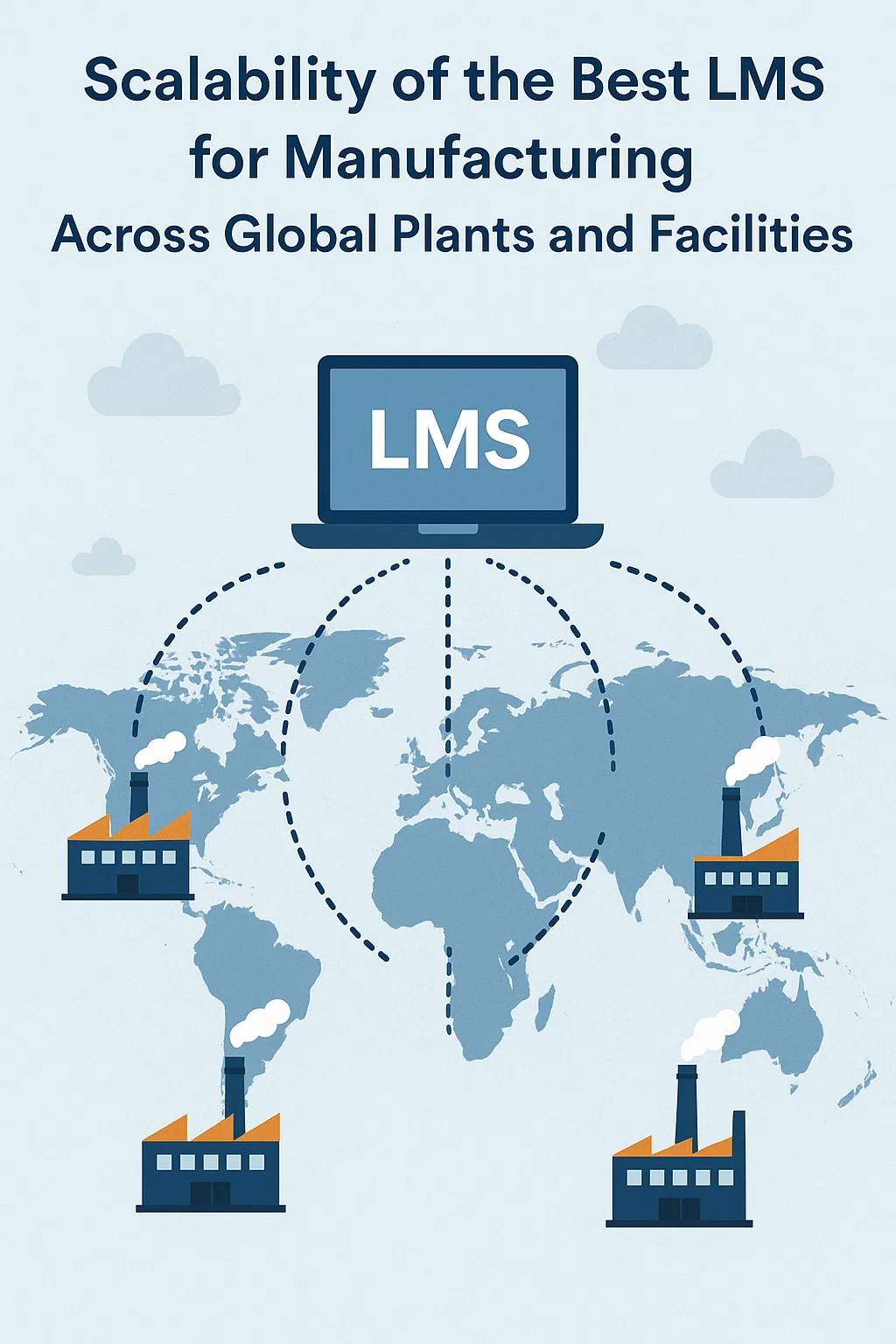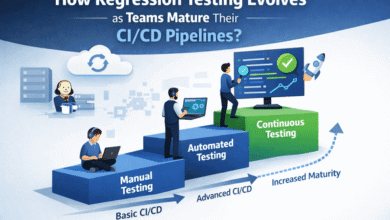Scalability of the Best LMS for Manufacturing Across Global Plants and Facilities

Introduction: Meeting Global Training Demands in Manufacturing
Manufacturing organizations operating across multiple countries face a critical challenge: delivering consistent, compliant, and effective workforce training at scale. The best LMS for manufacturing plays a strategic role in addressing this challenge by providing a centralized platform that supports global training requirements. With diverse regulations, languages, and operational practices, scalability is a key factor in selecting and implementing a learning management system that truly serves global manufacturing enterprises.
Executives, quality assurance managers, and directors of quality must understand how a scalable LMS integrates within a quality management system to support not just employee development, but overall compliance and operational excellence. This blog explores how the best LMS for manufacturing meets these demands, fostering quality management across global plants and facilities.
Global Manufacturing Complexities and the Need for a Scalable LMS
Operating manufacturing plants across continents introduces complexities such as varying regulatory standards, workforce skill levels, and training needs. The best LMS for manufacturing must accommodate these differences while maintaining a unified approach to quality management. Scalability in this context means the LMS can expand its capacity, adapt to regional requirements, and deliver seamless learning experiences regardless of location.
A scalable LMS supports multiple languages, time zones, and cultural contexts, ensuring training programs resonate locally while aligning globally. This adaptability enables manufacturing companies to uphold consistent quality standards across their entire footprint.
Regulatory Compliance and Cross-Border Training Challenges
Different jurisdictions impose distinct regulatory mandates on employee qualifications, certification renewals, and process adherence. The best LMS for manufacturing integrates with the quality management system to track compliance training and certifications, generating auditable reports that satisfy regulatory inspections worldwide.
Ensuring timely completion of mandatory training and seamless updates on evolving standards is essential to avoid production delays and compliance risks, particularly in highly regulated sectors such as Life Sciences and Automotive.
Architecture and Infrastructure Enabling Scalability
The scalability of the best LMS for manufacturing depends on its underlying architecture. Cloud-based learning management systems provide the agility and flexibility required to support global operations. Unlike legacy on-premise solutions, cloud LMS platforms offer rapid deployment, elastic capacity, and robust security controls suitable for dispersed manufacturing environments.
This architecture supports concurrent users across multiple sites, offers integration with enterprise resource planning (ERP) and quality management software, and delivers consistent performance regardless of geographic distribution.
Integration with Quality Management Systems for Unified Governance
A scalable LMS must seamlessly integrate with the enterprise quality management system to synchronize training records, document control, and compliance workflows. This integration enables quality managers to monitor training effectiveness alongside quality metrics, ensuring that employee competencies directly contribute to operational excellence.
The LMS-QMS synergy fosters real-time visibility into training compliance status, facilitating continuous improvement and risk mitigation.
Supporting Diverse Training Modalities and Workforce Types
Global manufacturing operations encompass a broad spectrum of roles—from assembly line operators to quality engineers and management staff. The best LMS for manufacturing supports diverse learning modalities including instructor-led training, eLearning modules, virtual classrooms, and on-the-job training documentation.
Scalability requires accommodating various content formats and delivery methods tailored to distinct learning preferences and accessibility needs across global plants. This flexibility helps sustain employee engagement and knowledge retention essential for maintaining quality standards.
Localization and Cultural Adaptation of Training Content
To maximize impact, training content must be localized for language, cultural relevance, and regulatory context. A scalable LMS provides tools for content translation, regional customization, and user segmentation. These features empower organizations to deploy standardized global training frameworks that are contextually adapted to each facility’s unique environment.
Such customization ensures compliance training resonates and achieves the desired behavioral outcomes worldwide.
Analytics and Reporting for Global Training Oversight
Visibility into training performance across global facilities is vital for quality leadership. The best LMS for manufacturing offers comprehensive analytics dashboards that aggregate KPIs such as course completion rates, assessment scores, certification statuses, and compliance deadlines.
Scalable reporting capabilities allow executives and quality managers to drill down by region, department, or job role, facilitating data-driven decisions. This real-time insight supports proactive management of training gaps and continuous quality improvement across all manufacturing sites.
Benchmarking and Continuous Improvement at Scale
With global data at their fingertips, organizations can benchmark training effectiveness across plants and implement best practices broadly. These insights drive continuous improvement initiatives that enhance workforce competency and compliance, contributing directly to higher product quality and reduced risk.
Scalability in analytics ensures that even the largest manufacturing enterprises maintain control and agility in their quality management efforts.
Security and Data Privacy Considerations for Global Deployments
Managing employee training data across multiple countries necessitates adherence to data privacy laws such as GDPR in Europe and other regional regulations. The best LMS for manufacturing incorporates stringent security protocols, role-based access controls, and encrypted data transmission to protect sensitive information.
A scalable LMS ensures that privacy and security policies are consistently enforced across all facilities, providing confidence to leadership and compliance auditors.
Managing User Access and Permissions at Scale
As manufacturing organizations grow, managing user roles and permissions becomes increasingly complex. Scalable LMS platforms provide granular administrative controls to delegate training management responsibilities across regions and departments while maintaining centralized oversight.
This balance supports operational efficiency and governance without sacrificing compliance.
Enabling Workforce Agility Amid Changing Manufacturing Demands
The manufacturing sector continually evolves with new technologies, processes, and regulatory changes. The best LMS for manufacturing scales to rapidly deploy updated training programs that address emerging skill requirements and compliance mandates globally.
This agility empowers manufacturers to keep their workforce competent and compliant, reducing downtime and ensuring consistent product quality across all plants and facilities.
Supporting Remote and Hybrid Workforce Models
Global manufacturing increasingly incorporates remote and hybrid workforce structures. A scalable LMS offers anytime-anywhere access to training content, enabling flexible learning that aligns with varied work schedules and locations.
This accessibility is crucial for sustaining quality management and operational continuity in dynamic manufacturing environments.
Strategic Considerations for Selecting a Scalable LMS
When evaluating LMS solutions, manufacturing leaders prioritize scalability features that align with growth trajectories and quality management objectives. Factors such as cloud infrastructure, integration capabilities, multi-language support, and robust reporting are essential.
Choosing the best LMS for manufacturing involves assessing vendor commitment to ongoing innovation, user experience design, and regulatory compliance to future-proof workforce development programs.
Ensuring Alignment with Quality Management System Goals
A scalable LMS is most effective when tightly coupled with the organization’s quality management system. This alignment ensures training supports compliance and quality objectives holistically, driving measurable business outcomes and strengthening operational resilience.
Conclusion: Why ComplianceQuest is Essential for Business in 2025
As manufacturing organizations expand their global footprint, the ability to scale workforce training effectively becomes a competitive differentiator. ComplianceQuest delivers the best LMS for manufacturing, architected on a secure, cloud-native platform that seamlessly integrates with enterprise quality management systems.
In 2025, ComplianceQuest empowers quality leaders to deliver consistent, compliant, and engaging training across global plants and facilities. Its scalability ensures that organizations can adapt swiftly to evolving regulatory landscapes and operational demands, reinforcing quality management and driving continuous improvement worldwide.
By investing in ComplianceQuest, manufacturing companies position themselves for sustainable growth, enhanced compliance, and operational excellence in an increasingly complex global marketplace.




